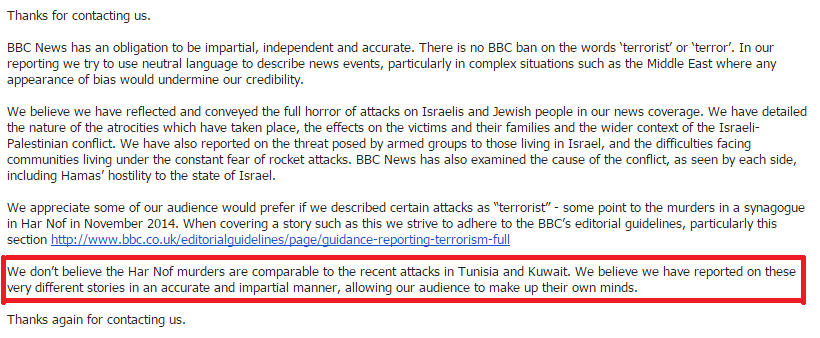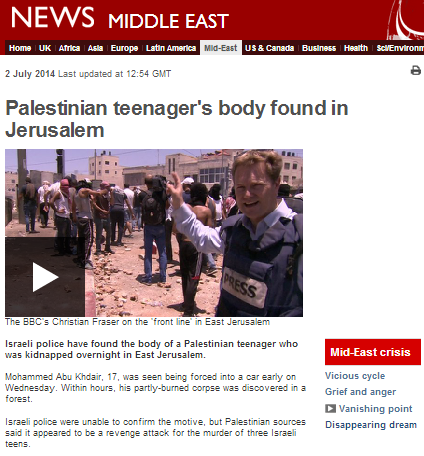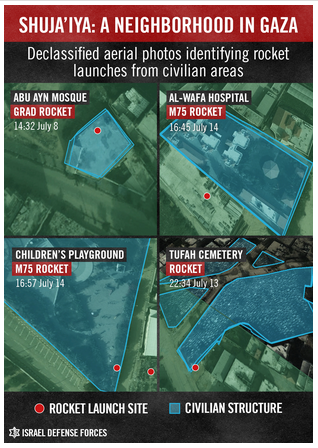On October 24th a sixth victim of the Har Nof terror attack succumbed to wounds sustained eleven months earlier. The death of Rabbi Haim Rothman did not receive any BBC coverage despite the incident having been widely reported by the corporation at the time.
“One outstanding – although predictable – feature of the BBC’s coverage is that despite the fact that the core story was about a terror attack perpetrated on the congregation of a synagogue, in all of the above reports the word terror and its derivatives were never used directly by the BBC. References to terrorism came only in the form of quotes from Israeli officials (placed in inverted commas by the BBC), from Israeli interviewees or from the US Secretary of State in the filmed report of his statement to the press.”
However, when fatal attacks took place in France, Kuwait and Tunisia on the same day in late June 2015, BBC coverage did define those attacks as terrorism.
In July 2015 BBC Watch submitted a complaint on the topic of inconsistency in the corporation’s use of the word terror.
“The BBC’s guidance on “Language when Reporting Terrorism” states: “Our policy is about achieving consistency and accuracy in our journalism” and “We also need to ensure that when we report acts of terror, we do so consistently in the stories we report across our services.”
In BBC coverage of the terror attacks which took place in Tunisia, Kuwait and France on June 26th 2015 the word terror was rightly and appropriately used on a variety of BBC platforms including BBC television news and social media. However, in coverage of terrorism against Israeli civilians in general – and the attack in a synagogue in the Har Nof area of Jerusalem in November 2014 in particular – the BBC refrains from using the word terror except when quoting others.
This clearly contradicts the claim made in the Guidance that the BBC’s policy is to achieve consistency and further highlights another section of the guidance which states: “The value judgements frequently implicit in the use of the words “terrorist” or “terrorist group” can create inconsistency in their use or, to audiences, raise doubts about our impartiality. [….] We also need to ask ourselves whether by using “terrorist” we are taking a political position, or certainly one that may be seen as such.”
For consistency, accuracy and impartiality to be achieved, terrorism in Israel must be reported in the same language as terrorism in Tunisia, Northern Ireland or the UK. That is currently not the case.”
The reply received stated:

We were of course unable to understand why the BBC does not “believe the Har Nof murders are comparable to the recent attacks in Tunisia and Kuwait” or in what way those stories are “very different” and so we submitted a further complaint asking for clarification of that point.
No response was forthcoming within the designated time-frame, and so a third complaint was submitted. Over two months after the original complaint was made, we received a response which opened as follows:

That response obviously does nothing to clarify the grounds upon which the BBC’s claim that terrorism against Israeli civilians is “very different” from terrorism against British holidaymakers in Tunisia or against worshippers in a mosque in Kuwait is based. We can however discern that the BBC has a two-tier system for reporting acts of terror which clearly contradicts its own editorial guidelines on that issue.
The fact that the BBC is obviously not prepared to engage in discussion of this issue is particularly unfortunate given that its policy of refusal to describe the murders of Israelis as terrorism provides ample evidence of “value judgements” made on the basis of “a political position” which do indeed call into question its impartiality. Whilst the BBC apparently believes that is not a “significant issue”, its funding public may of course believe otherwise.




